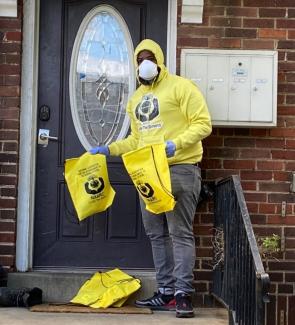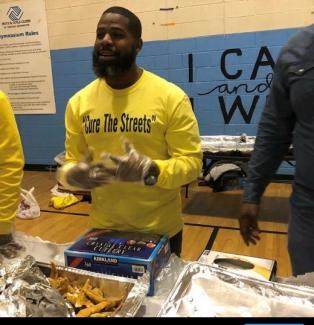Cure the Streets Spotlight: Cotey Wynn
As a Program Supervisor with OAG’s Cure the Streets, Cotey Wynn leads a team of six violence interrupters and outreach workers. When observing Cotey at work, you see a respected professional, a loving father, a devoted friend, and a pillar of the community.
What you don’t see is what he had to overcome.
Cotey has called the District’s Trinidad neighborhood home his entire life. After graduating from high school, he was on his way to accepting a baseball and football scholarship. He loved the fame and glory but found himself wanting more. That’s when he started making poor decisions that gave him a shortcut to the jewelry, the cars, and the money. “My peers glorified me for the wrong that I did,” he says. Five different times he was shot. And then, in 2004, Cotey was incarcerated.
To help paint a picture of what incarceration feels like for others, Cotey says: “Go in your bathroom, lock the door, and stay in there all day – because that’s what I had to go through for ten years. And that’s where I had to lay.” While incarcerated, he made a conscious choice to switch from negative to positive thinking and began to do violence interruption work in whatever way he could. He mediated conflicts between inmates and returned items that others had stolen. In 2014, he returned to the community he called home. But after ten years away and the impact of gentrification, Trinidad wasn’t the same – and neither was he.
Re-entering the community presented a whole new set of challenges. The damage to his reputation made it hard for him to find employment. But he wanted to stay on the right path and be a role model for his son. That’s when he found Cure the Streets and became a violence interrupter.
Fast forward to two years later, and Cotey is now a full-time Program Supervisor at the Ward 5 Cure the Streets Trinidad site. Cotey’s workdays are completely booked with community engagement activities. Whether helping people find employment, hosting a local event, or mediating a conflict. Sometimes Cotey and his team receive calls in the late hours of the night from community members who need their help, because, as he says, “the community loves our program, they trust us.”
When asked what his proudest moment has been in his time with Cure the Streets, he describes a moment where he received a call from a community member about two people arguing. He says it was because of the relationship that Cure the Streets had built with these two individuals that the community felt comfortable calling him to de-escalate the conflict.
Cotey and the Trinidad Cure the Streets team are examples of community-driven public safety work. They know first-hand about the challenges high-risk individuals in their community face and they are committed to helping those individuals overcome and thrive.
OAG’s Cure the Streets uses a data-driven, public-health approach to treat violence as a disease that can be interrupted, treated, and stopped from spreading. CTS is working in six sites with some of the highest rates of gun violence in Wards 5, 7 and 8.


